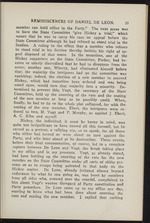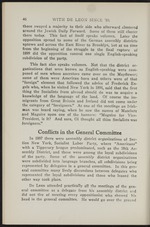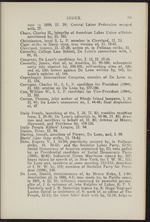| 1 |
 |
“...do so the whole plot collapsed, for with the
seating of the new member, Ebert, the intriguers were re-
duced to two, H. Vogt and P. Murphy, as against J. Ebert.
A, C. Kihn and myself.
^ Hickey, the individual, it must be borne in mind, was
quite too insignificant to have caused all this turmoil, but he
served as a pretext, a rallying cry, so to speak, for all those
who either had turned or were about to turri against the
Party, and who later aimed at its destruction. These events,
before their final consummation, of course, led to a complete
rupture between De Leon and Vogt, the break taking place
in my office and in my presence. Vogt, as already stated,
had been holding up the counting of the vote for the new
member on the State Committee under all sorts of shifty pre-
texts so as to escape being outvoted in that body on the
Hickey matter. De Leon, already irritated almost beyond
endurance by what he saw going on, was beset by members
from all sides who, aroused over the scandal, complained...”
|
|
| 2 |
 |
“...46 WITH DE LEON SINCE 89.
those swayed a majority to their side who afterward clustered
around the Jewish Daily Forward. Some of them still cluster
there today. This fact of itself speaks volumes. Later the
opposition spread to some of the German assembly districts
Uptown and across the East River to Brooklyn, but at no time
from the beginning of the struggle to the final rupture of
1899 did the opposition control one single English-speaking
subdivision of the party.
This fact also speaks volumes. Not that the district or-
ganizations that were known as English-speaking were com-
posed of men whose ancestors came over on the Mayflower;
some of them were American born and others were of that
foreign element that followed the advice of Frederick En-
gels who, when he visited New York in 1891, said that the first
thing the Socialists from abroad should do was to acquire a
knowledge of the language of the land. Of course the im-
migrants from Great Britain and Ireland did not come under
the...”
|
|
| 3 |
 |
“...99-100; subsequent
sorry role enacted by, 100-101; self-seeking aims of, 126;
end of, 130; letters against De Leon written by, 143; De
Leons opinion of, 144.
Copenhagen International Congress, enemies of De Leon at,
II. 156.
Corregan, Charles H., S. L. P. candidate for President (1904),
II. 103; oration on De Leon by, 177-186.
Cox, William W., S. L. P. candidate for Vice-President (1904),
II. 103.
Curran, Thomas, joint author of Rhode Island lampoon, 1. 35,
II. 93; De Leons comments on, I. 44-46; final disposition
of, 47.
Daily People, launching of the, I. 26, II. 82; troubles resulting
from, I. 29-30; De Leons editorials in, 95-96, II. 83; devo-
tion and sacrifices in behalf of, II. 85; defense of Moyer,
Haywood, and Pettibone by, 119-120.
Daily People Killers League, II. 94.
Damm, Peter, II. 94.
Darling, Joseph, anecdote of Flower, De Leon, and, I. 98.
Davis cigar shop strike, II. 78-82.
Debs, Eugene V., I. 53-54; popularity secured by, in Pullman
strike, II. 50-52; and the Socialist Labor...”
|
|
